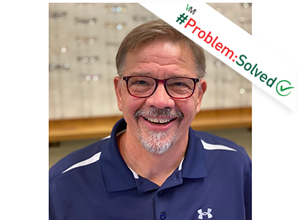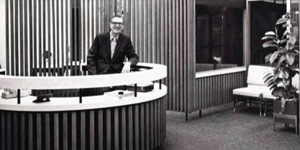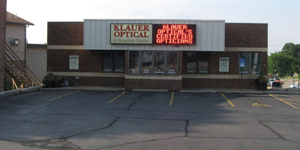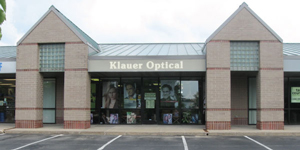
Practice manager Jeff Klauer.
|
NEW YORK—ECPs and eyecare practice managers seem to be exhibiting a more optimistic outlook on circumstances and taking steps to get back to more of a “normal” approach to business, according to the most recent Wave of Jobson's ECP Coronavirus Survey. If you’ve been following along with the Jobson surveys (we are up to Wave 15) you know what a tough journey the past six months have been for most small businesses in optical. Thankfully, it looks like things are finally beginning to look up but the lockdown and ensuing economic woes have exacted a toll on the industry and the road back to “normal” has not been easy.
For this week’s Problem Solved, I sat down with practice manager Jeff Klauer of Klauer Optical (remotely, of course) to talk about how his practice pivoted during the lockdown and again once the business reopened. Klauer is the practice manager of a two-location optometric practice with offices in Dubuque and Cedar Rapids, Iowa. Previously, he was president of Klauer Optical Co, which he owned with his wife Joyce.

Klauer Optical Co was founded in 1939 by two brothers, Eldon and Clarence Klauer, both of whom were experienced technical opticians. Originally a wholesale optical business, selling frames and edging lenses for Doctor’s offices, they had a contract with St.Louis Optical during WWII to produce lenses used in binoculars by the US Navy.
|
The company reorganized in 2018 when the Klauer’s son, Dr. Joseph Klauer, graduated from the Indiana University School of Optometry and came back to Iowa to practice. In 2019, Dr. Lauren Oberley, also an Indiana University School of Optometry graduate, joined the practice after a one-year residency in primary care and ocular diseases at the VA Northern Indiana Healthcare System in Fort Wayne, Indiana. Jeff and Joyce Klauer oversee the day-to-day business operations, and Dr. Klauer and Dr. Oberley manage the medical side of the practice.
Vision Monday: Can you briefly describe the practice and optical, what kind of clientele you cater to, and what services you offer?
Jeff Klauer: We are an 80+ year-old, four-generation optical company. Klauer Optical was started in 1939, in the midst of the Great Depression by my grandfather and his brothers. My father, Don Klauer, was an early contact lens pioneer, serving as president of the Iowa Optician’s Association, the Contact Lens Society of America, the Optician’s Association of America, and was a member of the first National Contact Lens Examiner (NCLE) Board. I learned from him that if you stay active nationally, you will stay relevant locally. This has served us very well.
We are a full service practice, offering optometric services, contact lenses, eyeglasses and other related services such as emergency repairs. We got out of surfacing in 2007 and still have a full finish lab on premise at our Dubuque location. We have many unique frame offerings and strive to bring the latest in fashion and style to Iowa. My friend, Ed Beiner, likes to say “People in Iowa like nice frames, too!”

The Dubuque location of Klauer Optical.
|
Vision Monday: How did the shutdown affect your business and what needed to be done in order to reopen. What kind of obstacles did you encounter and how did you deal with them?
Klauer: In Iowa, we were considered an essential service, so while we locked our doors and put routine eyecare on hold, we were at the store every day answering the phones and helping other essential workers with broken or lost eyeglasses. Dr. Klauer and Dr. Oberley saw emergency and urgent care patients. We did all of this with our two Doctors, two of our retail mangers and our lab manger. The simple things were what surprised me the most. How do we get our phone calls forwarded to tracfone? What do we do about UPS? USPS? All details everyone had to deal with.
There was a great need! I remember getting a call from an anesthesiologist from a small town to our north. He had just found out the optics in his extreme protection gear were not working and he had nowhere to go to get them updated. We were able to take care of his needs and had him seeing in the operating room in just a couple of days. We did this all through April, and we were down almost 90 percent from April of 2019.
We were given the opportunity to cautiously resume regular eyecare in May. My biggest concern was to be as safe as possible and protect our patients and ourselves from the virus. We decided the doors would be locked, with huge signs in the window for people to call when they were in our parking lot. We set up a receiving area, took temperatures, asked the questions and required masks.
There were many questions that needed to be answered. How do we disinfect inventory? What do we have to clean and when? We were able to quickly establish protocols for each of these challenges and others, using resources like our SPEC group, Opti-Port, our strategic partner, Essilor, our contact lens distributor, ABB, and our local financial partners.
We were ready for PPP very quickly and applied for EIDL money as soon as we were declared a Covid-19 disaster area by our governor. We also applied for the HHS grants which were available in two stages, receiving both. Our management group played a huge role in how quickly and efficiently we were able to change our business model to reflect the pandemic and to seek the financial help, which has kept us going.
Vision Monday: Can you talk a little bit about the SPEC Group and how it works. What kind of a role did SPEC play in allowing you to pivot throughout the pandemic and help you get your business going again?
Klauer: SPEC (Strategic Partnership of Eyewear Companies), formally EORG (Eastern Optical Research Group), was founded in 1972. We typically have around 15 member companies. Next year we would have had our 100th meeting, but the pandemic changed all of that, canceling our spring and fall meetings for 2020.
The idea behind the group is to exchange information on every facet of running a retail optical business or optometric practice. Inventory, cost of goods sold, payroll, marketing, human resources, technology, fashion, business value, credit card processing, technology, competition—virtually every facet of eyecare businesses. Each company shares a 6-month and year-end income statement, with trust and confidentiality being hallmarks of the group.
We collect data on the industry to compare our group performance. For the last 5 years, we have been reporting EBITDA and adjusted EBITDA in a comparative format for the group. We are now able to determine if the decisions we are making are affecting the value of our individual companies. If, for example, a member has a purchase offer, they are much better prepared to know what their business is worth, and what similar businesses are selling for.
We bring in speakers and vendors with forward-looking plans and aspirations. We are a great sounding board for new products and ideas as we represent a broad slice of the industry demographically and by market segment.
The SPEC group, which works like an extended board of directors, proved very valuable when it came time to react to the pandemic. Members in different parts of the country had different experiences at different times. Our Seattle member, for example, was an early warning beacon for the group during the current pandemic. We met many times via Zoom and traded information on all the protocols we would use to stay open, reopen, and proceed into the future. If a member had in-store signs designed, or new frame disinfecting protocols, all were shared freely. It was a huge advantage to have all these experts working together.

The Cedar Rapids location Klauer Optical. |
Vision Monday: What has been the reaction to your reopening? Has the business begun to recover financially?
Klauer: The reaction to our opening was humbling. We have been approaching pre-covid-19 business levels since June. We still have our doors locked and reduced hours. We do most adjustments and repairs in the parking lot and take outside Rx’s by appointment. We continue to pre-screen each patient who enters our building. Cautiously optimistic would be the best description of our revenue forecast, but we are worried about the fall and winter as the pandemic drags on and the economy continues to slow.
As for the future, the unknown lasting effects of the pandemic and the way it has changed our retail economy and the way we interact with our clients is what I see as the biggest challenges.